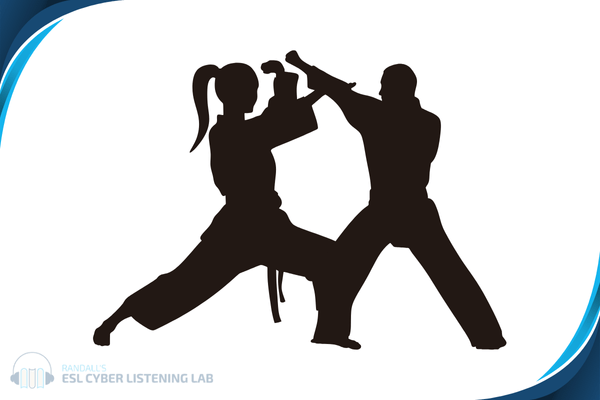General Listening Quiz
“Martial Arts”
| Level | Topic | Speakers | Length |
|---|---|---|---|
| Intermediate | Martial Arts | Man – Woman | 01:05 |

Pre-Listening Exercise
Some people learn martial arts for sport and exercise. However, how do people often protect themselves, their families, and property using martial arts such as karate and judo?
Agree or Disagree? Let’s Spark Some Conversation!
These statements are designed to get everyone thinking, exploring ideas, and sharing opinions.
-
In a face-to-face classroom: Read each statement aloud. If you agree, move to one side of the room; if you disagree, move to the other. Talk with your group—why do you feel that way?
-
In an online classroom: Use polls, emojis, or the chat box in your online platform to show your opinion. Then, join the conversation as a group or in breakout rooms.
-
For independent learners: Read each statement and think about your opinion. Then say your answer out loud and explain your reason, as if you’re talking to a classmate.
-
- Martial arts are more about discipline than fighting skills.
- Children should start learning martial arts at a very young age.
- Martial arts are safer than contact sports like football or rugby.
- Self-defense is the main reason to learn martial arts.
- Martial arts competitions make students too aggressive.
- Martial arts should focus more on mental training than physical training.
- Traditional martial arts are better than modern, mixed styles.
- Learning martial arts is more useful for life skills than for physical fitness alone.
- Martial arts instructors should never use physical punishment as a teaching method.
- Martial arts are only for people who want to fight or compete.
Idioms
“be fighting mad” = be very angry
“My wife was fighting mad when she found out that I went to Las Vegas without her.”
“pick a fight” = start a fight or an argument with someone
“Don’t pick a fight with Michael today. He is in a very bad mood.”
Listening Exercise
Listen to the recording and answer the questions. (See transcript)
Vocabulary and Sample Sentences
Here are some words and expressions that appear in the recording:
- hand over (verb): give up possession of something
– Robert had to hand over his driver’s license to the police because they caught him drinking and driving. - obviously (adverb): clearly
– Obviously, Jennifer can protect herself because she practices judo three times a week. - think something through (verb): think about or consider something carefully
– Why don’t you think things through before you buy that expensive car? - fool someone (verb): trick or deceive someone
– The robber fooled everyone at the bank by wearing a wig and a pink dress. - back off (verb): move away from someone
– The dog didn’t back off when I yelled at it. - cover (verb): pay for something
– My parents are going to cover my tuition at college next semester.
Vocabulary Practice
Do the vocabulary quizzes with the words from the conversation for more practice:
Post-Listening Exercise
In this conversation, the woman learned a form of martial arts to protect herself. How do you feel about the forms of protection below? Which of these do you or would you use personally in your daily life? Which are legal forms of protection in your city or country?
- a gun
- a spray such as mace
- a knife
- a dog
- a whistle or loud horn
- a big boyfriend
Online Investigation
Use the internet to find information on one form of protection from the Post Listening Task above and answer these questions:
- Is this form of protection legal in your country?
- Do you need some form of license from the government to own or use it?
- How much does the form of protection cost, for example, a gun?
- What percent of people use or own it?
- What are the benefits and dangers of using it?
- What are the penalties for using the method illegally or if it causes unintentional harm to others?